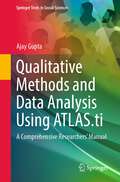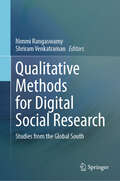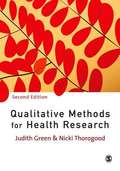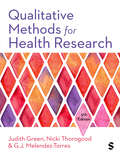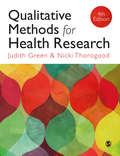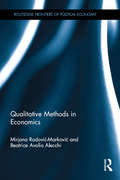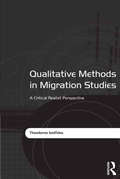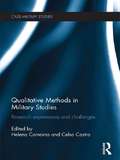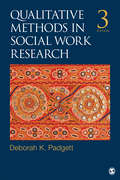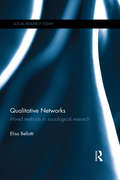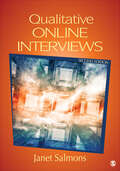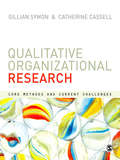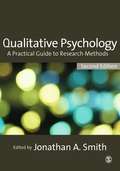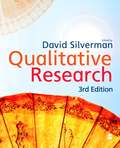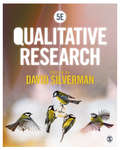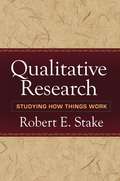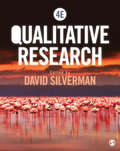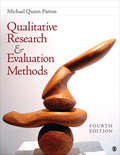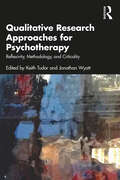- Table View
- List View
Qualitative Methods and Data Analysis Using ATLAS.ti: A Comprehensive Researchers’ Manual (Springer Texts in Social Sciences)
by Ajay GuptaThis book provides an in-depth roadmap for qualitative research methods and data analysis across disciplines using ATLAS.ti. It encompasses and rationalizes key qualitative research concepts and methods with innovative frameworks to enrich the reader’s understanding of qualitative research methods and data analysis. The book contains multiple real-world projects that assist readers in developing conceptual and theoretical knowledge, as well as gaining insights from fieldwork, visualizing data collection, analysis, and methodological interpretations.This easy to use book provides a pragmatic approach to qualitative methods, proficiency in capturing field observations, user-friendly steps to data analysis starting from transcription, preparation of data, reading and identification of quotations, coding, memoing, commenting, code groups, creating smart codes and groups using set, semantic, and proximity operators resulting in generating numerous insightful thematic reports in a variety of formats.More notable features:- Demonstrates systematic roots to research from begin to end- Provides practical advice on how to overcome field challenges during data collection, ethical considerations, and step-by-step procedures for gaining access to participants and capturing holistic data- Includes numerous numerical arguments, interpretations, and explanations for concepts, themes, variables, networks, and emerging concepts- Includes several research frameworks and data analysis guideposts on real-world research projects with thorough procedures covering 267 images and 38 tables- Compelling for quantitative research and mixed methods approachesThe book's straightforward and user-friendly format makes it simple and easy to use, comprehend, and interpret for anyone working with ATLAS.ti.
Qualitative Methods for Digital Social Research: Studies from the Global South
by Nimmi Rangaswamy Shriram VenkatramanThis volume offers a series of practical methods to study digital behaviours considering the socio-cultural realities of the global south. It includes methodologically rigorous applied research chapters from leading international researchers offering information on gold mines and blind spots in researching the digital in the global south. It develops a tri-sectional format based on distinct areas of research, geographical variability and diversity of methods and approaches. The first section focuses on Dissecting Research Fractures – which disrupts the established research ideologies and practices, user behaviors, theoretical perspectives, and field methods in the study of digital social research . The second section on Innovating Methods proposes and extends mixed methodologies that go beyond research boundaries to produce novel possibilities for study. The final section on Re-Imagining the Field breaks new ground in exploring the social-digital where a transient research field is contextualized and stabilized through the social, infrastructural, and digital interweaving. The book offers the reader an inside view of studying marginal yet emerging users and consumers of digital technologies. The three sections together purport to draw textual, graphical, temporal, and ethnographic insights via innovative and hybrid observational tools to record, annotate and formulate everyday experiences of digital life. The volume addresses scholars interested in hybridizing methods, early career researchers, and graduates working on connecting humans and digital technologies. It also holds considerable appeal for digital marketers and strategists, offering practically applicable methods to study digital life.
Qualitative Methods for Health Research
by Judith Green Nicki Thorogood'The new edition of Green and Thorogood's Qualitative Methods for Health Research presents a great choice for professors teaching courses across the health care spectrum due to its authors' ability to give students a diverse buffet designed to whet appetites and increase hunger for more qualitative research nourishment' - The Weekly Qualitative Report Suitable for researchers and students in the fields of public health, health services research, nursing and health promotion, Qualitative Methods for Health Research provides a thorough and practical introduction to designing, conducting and appraising qualitative research. Qualitative Methods for Health Research is full of easy-to-follow guidance on how to apply core research skills to health research. Drawing on over twenty years experience of teaching methodology, Green and Thorogood cover the essentials of the theory and principles of applied research in an accessible way. Using examples from a range of settings, this book introduces readers to the key debates in qualitative methodology; issues in designing ethical, feasible and rigorous projects; the main ways of collecting and analysing qualitative data and ways of appraising and writing qualitative research. This new, Second Edition covers developments in systematic reviews of qualitative research and analysis, and includes a chapter focusing on practical issues of qualitative work within applied health research programmes. Key features include: - Case studies - Chapter summaries and key points - Glossary Qualitative Methods for Health Research is an invaluable introduction for both health professionals and students with little prior knowledge of social theory. Judith Green is a Reader in Sociology of Health at the London School of Hygiene & Tropical Medicine Nicki Thorogood is a Senior Lecturer in Sociology at the London School of Hygiene & Tropical Medicine
Qualitative Methods for Health Research (Introducing Qualitative Methods series)
by Judith Green Nicki Thorogood G.J. Melendez-TorresWhether you are looking to interpret and evaluate existing health research, or conduct your own, this book discusses every step of the research process, from theory and ethics to data collection, analysis and dissemination. Clear, engaging and drawing on diverse examples from various health disciplines – from public health and nursing to occupational health and nutrition – this fifth edition: Offers detailed guidance on synthesising and integrating evidence, with a new chapter on systematic reviews. Fully embeds material on the effective use of digital and social media research in health across all chapters. Showcases what health research looks like in practice, with 28 case studies from across the globe. Ideal for undergraduates, postgraduates and beginner researchers in health and related fields, this book is a vital resource for building your confidence in understanding and doing qualitative research.
Qualitative Methods for Health Research (Introducing Qualitative Methods series)
by Judith Green Nicki Thorogood G.J. Melendez-TorresWhether you are looking to interpret and evaluate existing health research, or conduct your own, this book discusses every step of the research process, from theory and ethics to data collection, analysis and dissemination. Clear, engaging and drawing on diverse examples from various health disciplines – from public health and nursing to occupational health and nutrition – this fifth edition: Offers detailed guidance on synthesising and integrating evidence, with a new chapter on systematic reviews. Fully embeds material on the effective use of digital and social media research in health across all chapters. Showcases what health research looks like in practice, with 28 case studies from across the globe. Ideal for undergraduates, postgraduates and beginner researchers in health and related fields, this book is a vital resource for building your confidence in understanding and doing qualitative research.
Qualitative Methods for Health Research (Introducing Qualitative Methods)
by Judith Green Nicki ThorogoodPacked with practical advice and research quick tips, this book is the perfect companion to your health research project. It not only explains the theory of qualitative health research so you can interpret the studies of others, but also showcases how to approach, start, maintain, and disseminate your own research. It will help you: Understand the role of the researcher Develop an effective research proposal Seek ethical approval Conduct interviews, observational studies, mixed methods, and web-based designs Use secondary and digital sources Code, manage, and analyse data Write up your results Whether you are studying public health, sports medicine, occupational therapy, nursing, midwifery, or another health discipline, the authors will be your surrogate supervisors and guide you through evaluating or undertaking any type of health research. Judith Green is Professor of Sociology of Health at King’s College London. Nicki Thorogood is Programme Director, DrPH, at the London School of Hygiene & Tropical Medicine.
Qualitative Methods for Health Research (Introducing Qualitative Methods)
by Judith Green Nicki ThorogoodPacked with practical advice and research quick tips, this book is the perfect companion to your health research project. It not only explains the theory of qualitative health research so you can interpret the studies of others, but also showcases how to approach, start, maintain, and disseminate your own research. It will help you: Understand the role of the researcher Develop an effective research proposal Seek ethical approval Conduct interviews, observational studies, mixed methods, and web-based designs Use secondary and digital sources Code, manage, and analyse data Write up your results Whether you are studying public health, sports medicine, occupational therapy, nursing, midwifery, or another health discipline, the authors will be your surrogate supervisors and guide you through evaluating or undertaking any type of health research. Judith Green is Professor of Sociology of Health at King’s College London. Nicki Thorogood is Programme Director, DrPH, at the London School of Hygiene & Tropical Medicine.
Qualitative Methods in Economics (Routledge Frontiers of Political Economy)
by Mirjana Radović-Marković Beatrice Avolio AlecchiDespite numerous books on research methodology, many have failed to present a complete, hands-on, practical book to lead college classes or individuals through the research process. We are seeing more and more scientific papers from all research fields that fail to meet the basic criteria in terms of research methods, as well as the structure, writing style and presentation of results. This book aims to address this gap in the market by providing an authoritative, easy to follow guide to research methods and how to apply them. Qualitative Methods in Economics is focused not only on the research methods/techniques but also the methodology. The main objective of this book is to discuss qualitative methods and their use in economics and social science research. Chapters identify several of the research approaches commonly used in social studies, from the importance of the role of science through to the techniques of data collection. Using an example research paper to examine the methods used to present the research, the second half of this book breaks down how to present and format your results successfully. This book will be of use to students and researchers who want to improve their research methods and read up on the new and cutting edge advances in research methods, as well as those who like to study ways to improve the research process.
Qualitative Methods in Migration Studies: A Critical Realist Perspective
by Theodoros IosifidesRecent years have witnessed growing interest in a series of issues related to migration, including identity formation and change, the role of social capital and social networks, ethnic discrimination, racism and xenophobia, socio-political participation and mobilisation and the complex nature of the causal mechanisms linked to migration - issues that are better highlighted and investigated using qualitative methods. Moving away from the quantitative and empiricist-positivist approaches that have often characterised migration research, Qualitative Methods in Migration Studies explores in a concise but comprehensive way the key issues involved in researching migratory phenomena in a qualitative manner. It addresses themes including the basic characteristics of contemporary migration, qualitative research into social processes related to migration, and the relationship between theory, research design and practice. Drawing upon empirical case studies and a series of real and hypothetical examples, the book develops a critical realist alternative both to empiricism and interpretivist, social constructionist and post-structuralist relativism in qualitative migration research. With special emphasis on the meta-theoretical dimensions of qualitative research practice, this volume connects qualitative findings to policy formation and ’politics making’, exploring the multiple dimensions involved in researching migratory phenomena, such as ontology, epistemology, methodology, ethics and research practice. As such, it will be of interest to students and researchers in migration across the social sciences.
Qualitative Methods in Military Studies: Research Experiences and Challenges (Cass Military Studies)
by Helena Carreiras Celso CastroThis book examines the methodology of qualitative research in military studies. Since the end of the Cold War, the number of studies on military and society has grown substantially in substance, size and impact. However, only a tiny part of this bibliography deals in depth with the research methods used, especially in relation to qualitative methods. The data that form the basis of the researchers’ analyses are often presented as if they were immediately available, rather than as a product of interaction between the researcher and those who participated in the research. Comprising essays by international scholars, the volume discusses the methodological questions raised by the use of qualitative research methodology in military settings. On the one hand, it focuses on the specificity of the military as a social context for research: the authors single out and discuss the particular field effects produced by institutional arrangements, norms and practices of the military. On the other, the authors proceed in an empirical manner: all methodological questions are addressed with regard to concrete situations of field research. This book will be of much interest to students of military studies, research methods, sociology, anthropology, war and conflict studies and security studies in general.
Qualitative Methods in Social Work Research (SAGE Sourcebooks for the Human Services #36)
by Deborah K. PadgettQualitative Methods in Social Work Research provides accessible, how-to instruction for carrying out rigorous qualitative research. Deborah K. Padgett’s thoroughly revised Third Edition offers a comprehensive introduction to qualitative methods based on six major approaches: ethnography, grounded theory, case study, narrative, phenomenological, and participatory action research. Readers will appreciate the book’s ease of use, friendly writing style, and helpful cases/examples that combine attention to methodological rigor with pragmatic concerns for real-world relevance.
Qualitative Methods in Social Work Research (SAGE Sourcebooks for the Human Services #36)
by Deborah K. PadgettQualitative Methods in Social Work Research provides accessible, how-to instruction for carrying out rigorous qualitative research. Deborah K. Padgett’s thoroughly revised Third Edition offers a comprehensive introduction to qualitative methods based on six major approaches: ethnography, grounded theory, case study, narrative, phenomenological, and participatory action research. Readers will appreciate the book’s ease of use, friendly writing style, and helpful cases/examples that combine attention to methodological rigor with pragmatic concerns for real-world relevance.
Qualitative Networks: Mixed methods in sociological research (Social Research Today)
by Elisa BellottiHow do we interact with people in our everyday life? Who are the people we are connected to? What are the consequences of overlapping social circles and how people deal with the potential emerging conflicts? What are the structural and cultural mechanisms that regulate social worlds? Network science is a scientific approach to the study of network dependencies and associations which tries to answer these and many other questions. This book explores the underlying mechanisms that regulate social life as they are produced, reproduced, modified, and abandoned in the spatial and temporal patterns of interactions. The mixed methods approach, that combines formal network analysis with qualitative materials and statistical tools, shows the importance of contextualising structural mechanisms in their social and cultural environment, and allows overcoming the traditional methodological boundaries that shape the field of social sciences.
Qualitative Online Interviews: Strategies, Design, and Skills
by Janet SalmonsThe Second Edition of Qualitative Online Interviews provides researchers the guidance they need to extend the reach of their studies beyond physical boundaries. Focusing on designing, conducting, and assessing data drawn from online interviews as well as from observations, materials, and artifacts collected online, the book emphasizes the use of in-depth interviews in qualitative research or mixed-methods designs. Written in an easy-to-read manner, the thorough Second Edition offers the practical information and scholarly foundations needed to make thoughtful decisions in technology-infused research.
Qualitative Online Interviews: Strategies, Design, and Skills
by Janet SalmonsThe Second Edition of Qualitative Online Interviews provides researchers the guidance they need to extend the reach of their studies beyond physical boundaries. Focusing on designing, conducting, and assessing data drawn from online interviews as well as from observations, materials, and artifacts collected online, the book emphasizes the use of in-depth interviews in qualitative research or mixed-methods designs. Written in an easy-to-read manner, the thorough Second Edition offers the practical information and scholarly foundations needed to make thoughtful decisions in technology-infused research.
Qualitative Organizational Research: Core Methods and Current Challenges (Special Issues Of The European Journal Of Work And Organizational Psychology Ser.)
by Catherine Cassell Gillian SymonThis comprehensive text brings together in one volume both consideration of the core methods available for undertaking qualitative data collection and analysis, and discussion of common challenges faced by all researchers in conducting qualitative research. Qualitative Organizational Research: Core Methods and Common Challenges contains 27 chapters, each written by an expert in the area. The first part of the volume considers common challenges in the design and execution of qualitative research, examining key contemporary debates in each area as well as providing practical advice for those undertaking organizational research. The second part of the volume looks at contemporary uses of core qualitative methods in organizational research, outlining each method and illustrating practical application through empirical examples. Written by internationally renowned experts in qualitative research methods, this text is an accessible and essential resource for students and researchers in the areas of organization studies, business and management research, and organizational psychology. Key features: • Coverage of all the key topics in qualitative research • Chapters written by experts drawing on their personal experiences of using methods • Introductory chapters outlining the context for qualitative research and the philosophies which underpin it Gillian Symon is Reader in Organizational Psychology at Birkbeck, University of London. Catherine Cassell is Professor of Organizational Psychology at Manchester Business School.
Qualitative Psychology
by Jonathan A. SmithCovering all the main qualitative approaches now used in psychology - the Second Edition offers readers a step-by-step guide to carrying out research using each particular method with plenty of pedagogical advice. All chapters are written by international experts - many of them key figures in either the inception or development of their chosen method. Key features of the Second Edition include: - updated and extended chapters - examples of good research studies using each approach - text boxes and further readings
Qualitative Research
by David SilvermanThis hugely successful textbook has been fully updated and revised to make it even more accessible and comprehensive than previous editions. New chapters have been added on a range of key topics, including grounded theory, research ethics and systematic review. This book draws on a stellar list of leading qualitative researchers, each of whom is writing on their own specialized area in qualitative research, but doing so in a way that is clear and accessible to students and those new to the field of qualitative methods. All chapters also have added features - such as internet links, questions for readers and recommended readings. Alongside its engaging and accessible style, these new features make Qualitative Research the ideal textbook for all students working within this field. This is a comprehensive and accessible first text on qualitative methods that boasts a who's who of leading qualitative methodologists and is a must-have book for any student involved in doing research.
Qualitative Research
by David SilvermanWritten by leaders of qualitative methodology, this book provides up-to-date and interdisciplinary insight into a range of qualitative methods. Bringing together different perspectives, contributors discuss theoretical underpinnings of these methods before taking readers through the process of each approach and helping them develop skills needed to carry out this type of research autonomously and with confidence. Highlights include: New chapters on multimethod qualitative research, using digital data and video, and addressing social issues in research. More guidance on how to store and manage data appropriately. Advice on how to publish research in journals. Full of practical tips, exercises and summaries, this book continues to be a masterclass in qualitative research for students and researchers across the social sciences and beyond.
Qualitative Research
by David SilvermanWritten by leaders of qualitative methodology, this book provides up-to-date and interdisciplinary insight into a range of qualitative methods. Bringing together different perspectives, contributors discuss theoretical underpinnings of these methods before taking readers through the process of each approach and helping them develop skills needed to carry out this type of research autonomously and with confidence. Highlights include: New chapters on multimethod qualitative research, using digital data and video, and addressing social issues in research. More guidance on how to store and manage data appropriately. Advice on how to publish research in journals. Full of practical tips, exercises and summaries, this book continues to be a masterclass in qualitative research for students and researchers across the social sciences and beyond.
Qualitative Research
by Robert Stake Janet UsingerThis book provides invaluable guidance for thinking through and planning a qualitative study. Rather than offering recipes for specific techniques, master storyteller Robert Stake stimulates readers to discover "how things work" in organizations, programs, communities, and other systems. Topics range from identifying a research question to selecting methods, gathering data, interpreting and analyzing the results, and producing a well-thought-through written report. In-depth examples from actual studies emphasize the role of the researcher as instrument and interpreter, while boxed vignettes and learning projects encourage self-reflection and critical thinking. Other useful pedagogical features include quick-reference tables and charts, sample project management forms, and an end-of-book glossary. After reading this book, doctoral students and novice qualitative researchers will be able to plan a study from beginning to end.
Qualitative Research
by Professor David SilvermanA who's who of methodologists, this book introduces students to the big picture of qualitative research, teaching both the 'why' and the 'how to' of getting started, selecting a method and conducting research and data analysis. With practical tips, summaries, exercises and further reading, each chapter is like a masterclass from a leading scholar in qualitative research. New to the fourth edition: A streamlined structure to guide readers step-by-step through the research process Substantial new section with 4 chapters on how to collect and analyse online data A new chapter on reflexive ethnography More hands-on advice on how to conduct research at every stage, making this a perfect field handbook Updated reading lists provide a go-to guide to the literature and help improve citations The most comprehensive qualitative research book available, this is the perfect all-in-one companion for any student embarking on a qualitative research course or project.
Qualitative Research & Evaluation Methods: Integrating Theory and Practice
by Michael Quinn PattonDrawing on more than 40 years of experience conducting applied social science research and program evaluation, author Michael Quinn Patton has crafted the most comprehensive and systematic book on qualitative research and evaluation methods, inquiry frameworks, and analysis options available today. Now offering more balance between applied research and evaluation, this Fourth Edition illuminates all aspects of qualitative inquiry through new examples, stories, and cartoons; more than a hundred new summarizing and synthesizing exhibits; and a wide range of new highlight sections/sidebars that elaborate on important and emergent issues. For the first time, full case studies are included to illustrate extended research and evaluation examples. In addition, each chapter features an extended "rumination," written in a voice and style more emphatic and engaging than traditional textbook style, about a core issue of persistent debate and controversy.
Qualitative Research & Evaluation Methods: Integrating Theory and Practice
by Michael Quinn PattonDrawing on more than 40 years of experience conducting applied social science research and program evaluation, author Michael Quinn Patton has crafted the most comprehensive and systematic book on qualitative research and evaluation methods, inquiry frameworks, and analysis options available today. Now offering more balance between applied research and evaluation, this Fourth Edition illuminates all aspects of qualitative inquiry through new examples, stories, and cartoons; more than a hundred new summarizing and synthesizing exhibits; and a wide range of new highlight sections/sidebars that elaborate on important and emergent issues. For the first time, full case studies are included to illustrate extended research and evaluation examples. In addition, each chapter features an extended "rumination," written in a voice and style more emphatic and engaging than traditional textbook style, about a core issue of persistent debate and controversy.
Qualitative Research Approaches for Psychotherapy: Reflexivity, Methodology, and Criticality
by Keith Tudor Jonathan WyattQualitative Research Approaches for Psychotherapy offers the reader a range of current qualitative research approaches congruent with the values and practices of psychotherapy itself: experience-based, reflective, contextualized, and critical. This volume contains 14 compelling, challenging new essays from authors in both the Northern and Southern hemispheres, writing from a range of theoretical and cultural perspectives. The book covers both established and emerging approaches to qualitative research in this field, beginning with case study, ending with postqualitative, and with hermeneutic, reflexive, psychosocial, Talanoa, queer, feminist, critical race theory, heuristic, grounded theory, authoethnographic, poetic and collaborative writing approaches in between. These chapters introduce and explore the complexity of the specific research approach, its assumptions, challenges, ethics, and potentials, including examples from the authors’ own research, therapeutic practice, and life. The book is not a ‘how to’ guide to methods but, rather, a stimulus for psychotherapy researchers to think and feel their way differently into their research endeavours. This book will be an invaluable resource to postgraduate students, practitioners and established researchers in psychotherapy who are undertaking (or considering) qualitative research for their projects. It will also appeal to course tutors and trainers looking for a volume around which to structure a qualitative research methods course.
